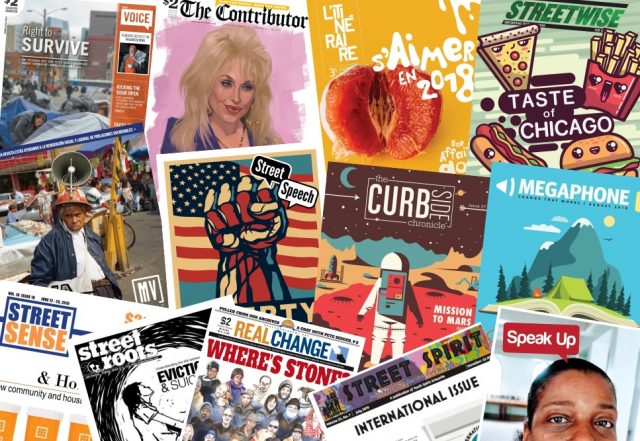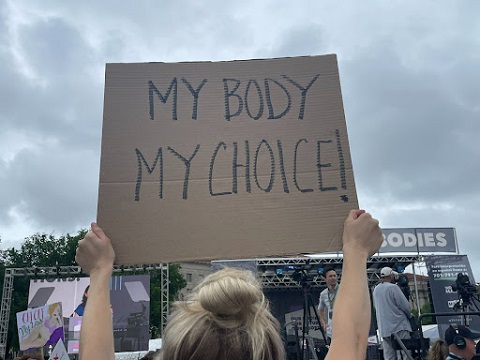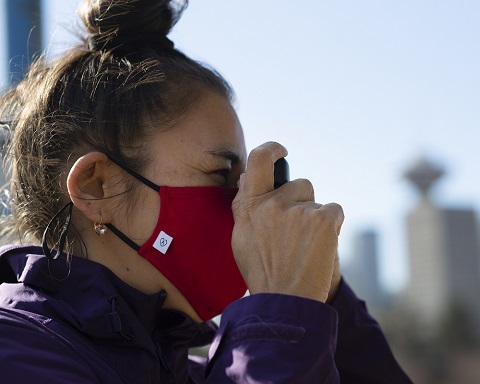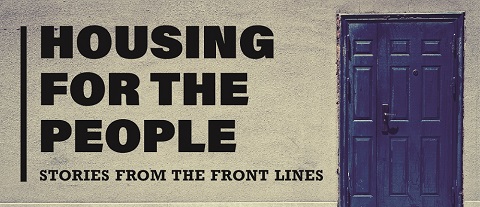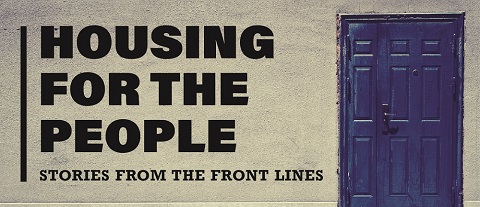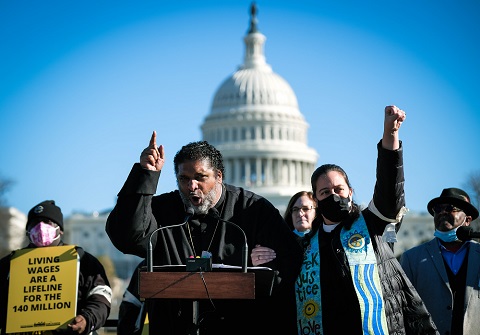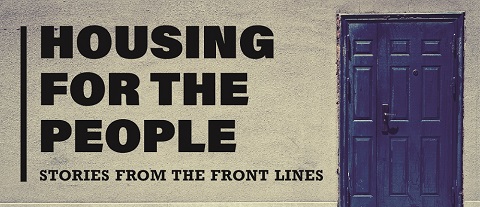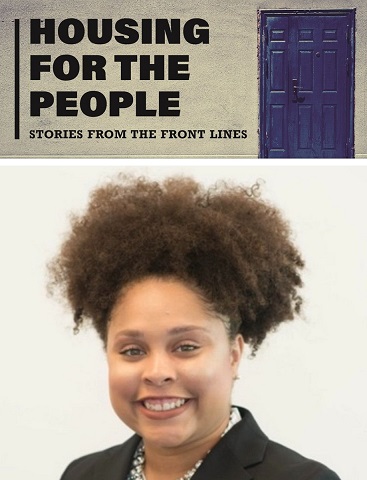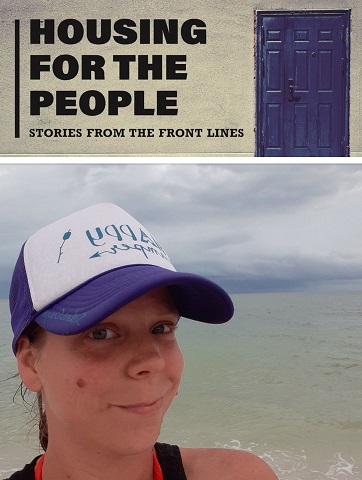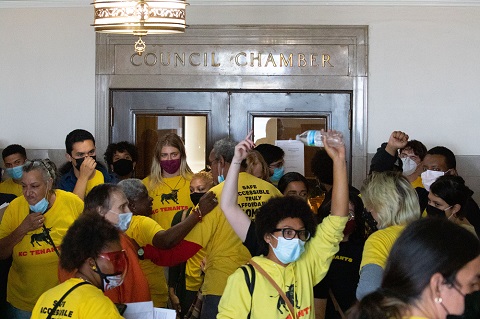By Nathan Poppe, The Curbside Chronicle (Oklahoma City)
These are confusing times. That doesn’t change the fact that people experiencing homelessness need assistance. The goal of this article is to illustrate who’s on the front lines receiving or lending a helping hand. Each conversation started with the same question: How are you getting by today? Necessities like showers and fresh food aren’t as simple to access. You might even expect a lot of social services to be completely closed, but many workers are finding alternative ways to still safely help.
With the assistance of outreach workers and access to The Homeless Alliance campus, I went outdoors to interview our neighbors as well as touch base about the services that are missed most. The hope is people feel heard and the importance of social services are abundantly clear. This is how people are getting by.
![A small tent camp sits behind an empty Oklahoma City business on April 2, 2020. An outreach team dropped off meals to help feed the camp. [Credit: Nathan Poppe]](https://hub.insp.ngo/wp-content/uploads/2020/05/TCC_Oklahoma-COVID_1.jpg) JIM
JIM
Jim’s sleeping bag is among his handful of possessions. He’s wrapped himself in it — like a giant blanket — to fight the freezing temperature and bitter winds. You don’t need to be a meteorologist to know it was awful outside. Jim says his options for shelter are limited. Leaving his spot might mean losing his sleeping bag. That’s a big risk. Without money, he has nowhere to go and no means to travel. He’s been experiencing homelessness for five years. His days aren’t dramatically different in the face of COVID-19, but it has removed something valuable. A bed.
“It gets cold out here. Especially in the rain,” he said. “I’d normally spend the night inside the Salvation Army. They haven’t been open overnight with extra beds. It sucks staying out in this. It really does.”
![Jim kept warm under a sleeping bag on a freezing cold April 2 morning. He rarely leaves his camp and has been struggling with not being able to secure a bed at night. [Credit: Nathan Poppe]](https://hub.insp.ngo/wp-content/uploads/2020/05/TCC_Oklahoma-COVID_2.jpg)
While the Salvation Army’s emergency shelter remained open during the pandemic, their beds often fill to capacity every night. Under normal circumstances, they open overflow beds when temperatures drop below freezing as one of the shelters participating in the community’s cold weather contingency plan. This cold weather contingency plan allows for the shelter to sleep an additional 90 individuals on top of their 109-person limit. Not today though. COVID-19 has interrupted the emergency process. When the pandemic broke, the City of OKC Homeless Services recommended pausing the program due to increased risk of exposing shelter residents to COVID-19 by trying to exceed current shelter capacities.
Still, Jim is grateful for having a meal delivered. Several organizations stepped up their street outreach efforts during the pandemic by delivering meals, supplies and information about current news.
“It makes things a lot easier,” Jim said. “It makes a difference. It does.”
The Salvation Army looks forward to participating with other area shelters to provide cold weather or severe weather sheltering when it is deemed safe for our guests. Safety is a high priority for us and for those in need of safe shelter.
— Susan Ellis, Salvation Army
![Jim kept warm under a sleeping bag on a freezing cold April 2 morning. He rarely leaves his camp and has been struggling with not being able to secure a bed at night. [Credit: Nathan Poppe]](https://hub.insp.ngo/wp-content/uploads/2020/05/TCC_Oklahoma-COVID_3.jpg)
COLTON
The downtown library offers so much more than books. For Colton, it’s four stories of warmth, internet access and a safe place to charge his phone. Metropolitan Library System buildings will remain closed — even as curbside pickup for books begins May 4 — and that’s a loss to countless individuals and families who rely on the library. Computer access was essential to Colton’s library visits. The Curbside vendor is on a job hunt during a particularly difficult time in addition to experiencing street homelessness.
“Even with COVID-19, places are still hiring,” Colton said. “Not having that resource hurts. I could easily check my email. Now, I’m in a dead zone. All those applications I put in, I’m afraid I might be missing out. … I miss the library.”
![Colton holds his adopted dog, Pepper, which he started taking care of early in the pandemic. [Credit: Nathan Poppe]](https://hub.insp.ngo/wp-content/uploads/2020/05/TCC_Oklahoma-COVID_4.jpg)
Local churches and volunteer organizations stopped by Colton’s tent as the pandemic progressed, but those visits have slowed down due to shelter-in-place restrictions. He’s thankful for meals delivered daily by The Homeless Alliance and others. He normally gets dinner at Jesus House. He said it was surreal when they closed their gates and started handing out meals through the fence.
Still, a meal makes it easier to get to tomorrow in the face of ever-changing weather and losing access to comforts that were once within reach. It’s all frustrating, he said. But he understands where it’s all coming from and is looking forward to securing housing when the pandemic blows over.
We realize that for some of our customers visiting our libraries is a way of life and closing our physical locations changes their everyday habits. Whenever we do open, we look forward to seeing them again — whether it’s on our computers, reading the newspaper or just checking out a good book.
— Kim Terry, Metropolitan Library System
![Colton holds his adopted dog, Pepper, which he started taking care of early in the pandemic. [Credit: Nathan Poppe]](https://hub.insp.ngo/wp-content/uploads/2020/05/TCC_Oklahoma-COVID_5.jpg)
BRUCE
Oklahoma City is a ghost town. That’s how Bruce sees it when he’s walking through normally populated entertainment districts like Bricktown and Midtown. He’s used to seeing crowds. Now, it feels like an empty town in a Western movie, he said.
“You have to do a lot of walking when you’re homeless. It’s hard to come by much of anything,” Bruce said. “People aren’t wanting you to use their restroom. People would rather not talk to you. … It’s not that they think you got it. They just don’t know who got it. It’s a scary thing.”
COVID-19 isn’t the first emergency Bruce has faced. In 2005, he was displaced by Hurricane Katrina and found a home in Oklahoma City. Bruce is 64. Nearly 50 of those years were spent cooking and baking. He has experienced street homelessness for the past two years. He’d been working on housing, but that’s on pause. Life on the street is a struggle, he said.
![Bruce stands outside the Oklahoma City Day Shelter. He relies on the shelter for lunch on weekdays. [Credit: Nathan Poppe]](https://hub.insp.ngo/wp-content/uploads/2020/05/TCC_Oklahoma-COVID_6.jpg)
“I don’t spend a lot of time in shelters because it gives me flashbacks of being locked up,” he said. “It’s rough knowing that a virus is going around. Things will be normal again. They will. They always have and they always will. There’s always something negative in the world that scares mankind, you know what I’m saying?”
Downtown definitely isn’t the same without everyone gathering for events and frequenting their favorite places in each district. We miss seeing the community on the streets of downtown and look forward to when it is safe to do so again.
— Danielle Dodson, Downtown OKC
SAM AND JENNIFER
Are you familiar with the term outreach? It’s a lot like it sounds, and it boils down to making connections. Sometimes it’s as simple as a referral for a new ID. Maybe it’s sharing information about mental health or substance abuse services. Jennifer Beach and Sam Dyer have watched this work change dramatically during the past two months.
The Homeless Alliance employees — along with a handful of collaborators from partnering agencies — focus on delivering basic needs throughout Oklahoma City. Food. Masks. Hand sanitizer. Anything that makes people feel safer living outside. Jennifer and Sam are undoubtedly stretched thin as they make daily deliveries to several tucked away camps and to regulars they recognize downtown.
“There’s only so much we can do to connect people to services, which is the main point of outreach,” Jennifer said. “Still, we have to get out there and get the work done the best we can.”
![Sam, left, and Jennifer ready food and supplies for an outreach stop near downtown Oklahoma City. They are both employees of The Homeless Alliance in Oklahoma City and spend their days ensuring the homeless community has access to basic necessities. [Credit: Nathan Poppe]](https://hub.insp.ngo/wp-content/uploads/2020/05/TCC_Oklahoma-COVID_7.jpg)
Behind the wheel of a silver Pontiac Grand Am, Jennifer and Sam slowly drive near camps that are expecting them. A few honks on the horn let’s people bunkered down in their tents know that food and supplies have arrived. They do this multiple times on weekdays and pack extra items on Fridays to help through the weekends. One camp shared how difficult it is to dumpster dive now because many restaurants are closed and less food is getting thrown out at grocery stores.
“They’re not finding food in the dumpsters like they normally do,” Jennifer said. “Without us, it’s likely they wouldn’t eat that day.”
Unfortunately, that same camp was recently asked to move because it sat on federal property. Homeless camps face a near constant struggle with property owners, neighboring individuals and businesses. It’s common for camps to pack up and move together to find a new space.
“This camp will have to relocate, and we’ll find out where,” Jennifer said. “This food will still get delivered.”
There’s only so much we can do to connect people to services, which is the main point of outreach. Still, we have to get out there and get the work done the best we can.
— Jennifer Beach, The Homeless Alliance
WES
Hygiene isn’t easy in the face of a pandemic. As much as Wes would love to take a shower at the Oklahoma City Day Shelter, he can’t. The amenity is a popular resource at the day shelter and the only means for many people to get access to a shower. Wes misses it. Many of the people who stay in his campsite rely on the day shelter to stay clean. Deodorant and hygiene kits only help so much.
“I think about the FEMA shower trailers I’ve seen on the news during disasters,” Wes said. “If one of those could come to the camp, that’d be amazing.”
Wes is used to living outside and using a tent as shelter. When he hears the advice to bunker down and stay inside, it’s not too different from waiting out bad weather. He’s also used to staying close to his camp. So are his neighbors. It’s communal, he said. Oftentimes, everyone pools their food together to share a large dinner.
![Wes sits inside his tent after receiving donated food and supplies. [Credit: Nathan Poppe]](https://hub.insp.ngo/wp-content/uploads/2020/05/TCC_Oklahoma-COVID_8.jpg)
“We can still stay inside our tents,” he said. “We’re not going into stores. We’re not going where there’s a higher susceptibility for COVID-19.”
Stopping shower service was one of the hardest things we had to do. As we know for many, that is their only option. We debated over it, but ultimately decided it wasn’t safe to have hundreds of people coming in for showers. We are implementing new limits and sanitizing procedures and are looking forward to opening them again in May.
— Dan Straughan, The Homeless Alliance
NATHAN
Nathan was new to the Oklahoma City Day Shelter. He was in need of a shower and a decent meal. Unfortunately, the showers were closed, but the provided lunch was helpful. The Oklahoma City native was thankful for any relief. He’d lost his shelter behind a gas station, and it weighed heavy on his mental and physical health.
![Nathan was willing to be interviewed but wasn’t comfortable showing his face in a portrait. He said his struggle with addiction was complicated by COVID-19. [Credit: Nathan Poppe]](https://hub.insp.ngo/wp-content/uploads/2020/05/TCC_Oklahoma-COVID_9.jpg)
“Even with COVID-19, it’s important to get a meal and have a place where nobody can hassle me,” Nathan said. “If you wanna go get a dollar burger at McDonald’s, you have to have a car. I didn’t even try because they won’t take someone walking up to the window.”
Nathan’s just riding things out as best as he can. His goal is to become sober. That’s especially difficult because he’s been unsuccessful in finding a rehab facility that’s open and performing intake for new clients. Nathan is prone to panic attacks. The faster COVID-19 ends, the faster he can find help.
“That’s what I hope,” he said. “We ride it out.”




